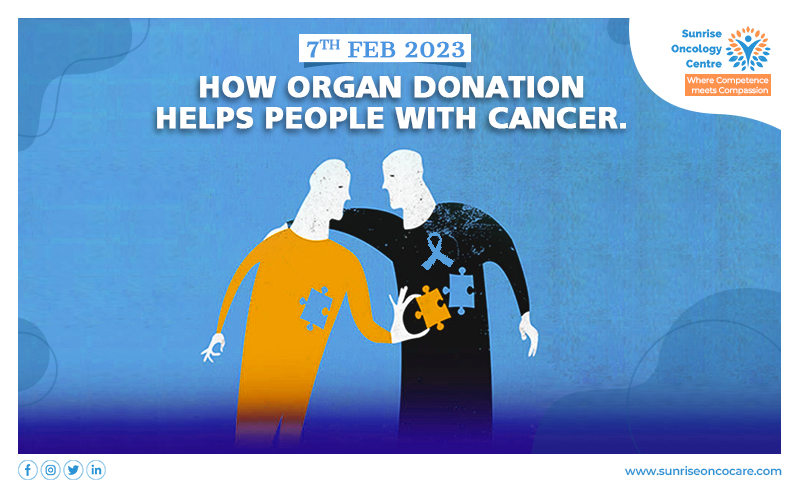Cancer is a condition that causes the body’s cells to grow uncontrollably and to spread to other bodily areas. It can begin practically anywhere in the body and spread to neighbouring healthy cells or tissues or even invade them.1
Roughly 10 million deaths, or nearly one in every six, were caused by cancer in 2020, making it the top cause of death globally.2
The use of cigarettes, having a high body mass index, drinking alcohol, eating few fruits and vegetables, and not exercising account for around one-third of cancer-related fatalities.2
The estimated worldwide burden of cancer in 2040 will be 27.5 million new cases and 16.3 million cancer-related deaths.3
It was determined that 14,61,427 incident cases of cancer occurred in India in 2022. In India, 1 in 9 individuals has a lifetime risk of developing cancer. The most common cancer in both men and women were lung and breast cancer, respectively.4
In terms of new cases of cancer, the most common in 2020 were:2
- Breast (2.26 million cases)
- Lung (2.21 million cases)
- Colon and rectum (1.93 million cases)
- Prostate (1.41 million cases)
- Skin (non-melanoma) (1.20 million cases)
- Stomach (1.09 million cases).
How can organ donation help people with cancer?5
The possibility of an organ transplant as a kind of treatment exists for some forms of cancer. An individual with early-stage liver cancer, for instance, could be eligible to have a liver transplant. Hereditary amyloidosis, a rare protein condition that may be connected to some blood malignancies, can also be effectively treated with a liver transplant. Transplants for the heart and kidneys might be useful in treating this condition.
Aside from being used for organ transplantation, organ donation can also help lead to medical breakthroughs through research into cancer and many other diseases. While organs are considered for transplant first, they can’t always be used because of the donor’s health history or how they died. If the donor gave consent, non-transplantable organs can be donated to researchers at qualified medical research facilities.
Organ donation can help people with cancer in a few ways–6,7,8
Liver Transplants: Liver transplantation can be used to treat people with liver cancer who have reached the advanced stages of the disease when other treatments are no longer effective.
A liver transplant may be the sole option for some persons with hepatocellular carcinoma (HCC), the most prevalent form of liver cancer. However, there are very few donor organs available for transplant.
Potentially transplantable liver cancer
A liver transplant may be an option for treatment if your cancer is still in its early stages but the rest of your liver is unhealthy. If the tumor is in a difficult-to-remove area of the liver, a transplant may potentially be a possibility (such as very close to a large blood vessel). It may take a while for a liver to become available for transplantation in a candidate. They frequently receive various therapies, including embolization or ablation (a minimally invasive procedure that blocks or closes a specific blood vessel), to keep cancer under control while they wait.
Kidney Transplants: People with kidney cancer may require a kidney transplant if their cancer has spread to both kidneys or if their remaining kidney is not functioning properly.
It’s important to note that organ donation after death is necessary for these life-saving procedures to occur. Donating organs can save lives and make a huge difference in the health and well-being of others.
Organ donation can save lives and improve the quality of life for people facing organ failure. Some benefits of organ donation include:5,9
- Transplantation of organs such as the heart, liver, kidney, pancreas, and lungs can save the lives of people suffering from organ failure.
- Improved quality of life for transplant recipients who can return to work, school, and other activities they enjoy.
- Helping to reduce the number of people on the waiting list for a lifesaving transplant.
- Advancements in medical research through the use of donated organs for study.
- The opportunity to make a difference in someone else’s life and give the gift of life to another person.
- Bringing comfort to families who have lost a loved one, knowing that their loved one has helped to save the lives of others.
Who can donate?10,11
Anyone can register and become an organ donor. There is no age limit for becoming an organ donor. For donors, under 18 years parents and guardians can register their children, and children can register themselves.
You can still donate organs if you:
- Are Having an illness or medical condition (Medical professionals determine at the time of donation if any or all donated organs or tissue are transplantable after considering your medical, travel, and social histories.)
- Are a smoker
- Drink alcohol
- Are having a tattoo
A person cannot become an organ donor if they have or are suspected of having:
- Creutzfeldt-Jakob Disease (CJD)
- Ebola virus disease
- Actively spreading cancer
- HIV
- Severe infection
Blood and tissue type compatibility is tested. It’s easier to transplant an organ if the donor and recipient are a good match. But if the blood and tissue types do not match the recipient will receive special treatments to prevent their body from rejecting the donor organ.
The bottom line is, organ donation can greatly benefit individuals with cancer by providing them with a life-saving transplant, such as an organ transplant (such as the liver or kidney), allowing them to replace damaged or diseased organs with healthy ones, thus improving their quality of life and potentially prolonging their life. However, it is important to note that not all individuals with cancer are eligible for transplantation and it may not always be the best option for every patient, as various factors such as the type and stage of cancer, overall health, and availability of suitable donors must be considered.
References:
- What is cancer? Available at: https://www.cancer.gov/about-cancer/understanding/what-is-cancerLast accessed on 2nd February 2023.
- Cancer, Available at: https://www.who.int/news-room/fact-sheets/detail/cancer#:~:text=Cancer%20is%20a%20leading%20cause,and%20rectum%20and%20prostate%20cancers.Last accessed on 2nd February 2023.
- Global Cancer Facts and Figures, Available at: https://www.cancer.org/research/cancer-facts-statistics/global.htmlLast accessed on 2nd February 2023.
- Sathishkumar K, Chaturvedi M, Das P, Stephen S, Mathur P. Cancer incidence estimates for 2022 & projection for 2025: Result from National Cancer Registry Programme, India. Indian J Med Res. 2022 Dec 13.
- Can I donate an organ to a person with cancer? Available at: https://www.cancer.net/blog/2020-01/can-i-donate-organ-person-with-cancer#:~:text=Aside%20from%20being%20used%20for,history%20or%20how%20they%20died Last accessed on 2nd February 2023.
- Study Tackles Key Questions about Liver Transplants for People with Liver Cancer Available at: https://www.cancer.gov/news-events/cancer-currents-blog/2022/liver-transplant-liver-cancer-downstaging Last accessed on 2nd February 2023.
- Treatment of liver cancer, by stage Available at: https://www.cancer.org/cancer/liver-cancer/treating/by-stage.html, Last accessed on 2nd February 2023.
- Kidney Transplant, Available at: https://www.hopkinsmedicine.org/health/treatment-tests-and-therapies/kidney-transplant Last accessed on 2nd February 2023.
- Moritsugu KP. The power of organ donation to save lives through transplantation. Public Health Rep. 2013 Jul;128(4):245-6.
- Who can become an organ donor? Available at: https://www.organdonation.nhs.uk/helping-you-to-decide/about-organ-donation/who-can-donate/ Last accessed on 2nd February 2023.
- Organ Donation and transplant, Available at: https://www.webmd.com/a-to-z-guides/organ-transplant-donor-information last accessed on 2nd February 2023.

